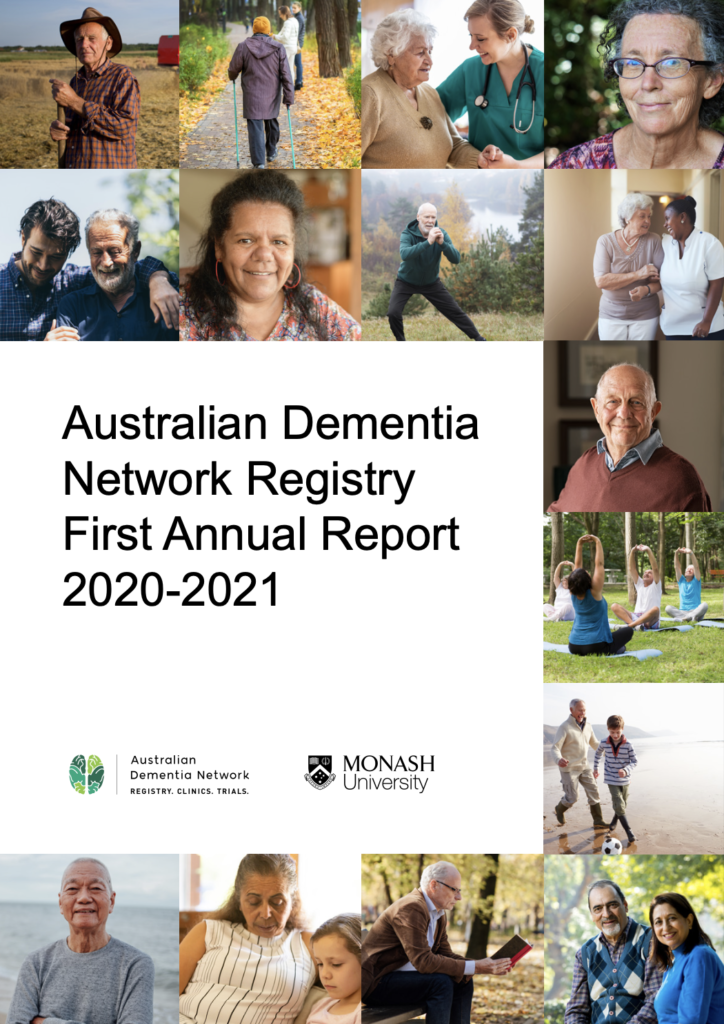 From the Director
From the Director
Welcome to the July 2022 edition of the ADNeT newsletter and greetings from sunny San Diego, California where I’m attending the Alzheimer’s Association International Conference.
I hope to provide you with some highlights in the next issue.
In this issue:
· ADNeT Clinical Quality Registry releases First Annual Report 2020-2021
· New research paper from ADNeT researchers on memory clinic practices in Australia
· Australian Dementia Network and University of Sydney launch national survey on current cognitive intervention practices in memory clinic settings
· Register for the upcoming CogSleep Symposium
· Participants needed for University of Wollongong study on diet and cognition
· Updates on grant opportunities and ADNeT
· Webinar viewing
I hope you enjoy this month’s newsletter.
Chris
News
ADNeT Registry releases First Annual Report 2020-2021
The Australian Dementia Network (ADNeT) Registry, managed by Monash University, launched its first Annual Report 2020-2021 in July. Dementia affects nearly half a million Australians and is the second leading cause of death and the third leading cause of disease burden in Australians aged over 65. While scientists work towards identifying more effective treatments, the quality of care that can be provided by clinicians during diagnosis can make a positive difference to the experience and outcome of people living with dementia or prodromal dementia syndromes, such as mild cognitive impairment, along with their caregivers.
The ADNeT Registry is the first registry to record national, systematic data to measure the quality of dementia diagnosis and care and allow clinicians, healthcare providers and policy-makers to monitor quality of care and improve performance, and better understand the experience and outcomes from the perspectives of patients and their caregivers.
The First Annual Report provides a “Report Card” on the quality of care being delivered to Australians diagnosed with dementia and mild cognitive impairment.
Key facts contained in the first annual report:
· 80 years old was the median age for diagnosis of dementia
· Dementia is prevalent in more women (56%) than men (44%) in the ADNeT Registry
· Nearly 40% of persons in the ADNeT Registry were born in a country other than Australia
· Over 40% of patients waited more than 3 months before having an appointment at a dementia and cognition clinical service after being referred
· Over three quarters of all new dementia diagnoses involve Alzheimer’s Disease
· Nearly one third of persons diagnosed with dementia are driving at the time of diagnosis
· Nearly 30% of those diagnosed with dementia are living alone at the time of diagnosis, with this group potentially more vulnerable to increased risk of hospitalisation or entry into residential aged care
· There are significant variations in prescription of acetyl cholinesterase inhibitors for persons diagnosed with Alzheimer’s type dementia.
Dr Stephanie Ward, the ADNeT Registry Clinical Lead and Senior Research Fellow at UNSW’s Centre for Healthy Brain Ageing (CHeBA) said, “The diagnosis and clinical care for dementia, and syndromes that may represent the prodromal phases of dementia, such as mild cognitive impairment, provides lots of challenges for clinicians. Providing good care is complex but participating in the ADNeT Registry allows us clinicians an important opportunity to benchmark our performance and understand the true experience of our community. The Registry supports clinicians like me to deliver the best possible care that we can.”
ADNeT research study finds improvements needed in Australian memory clinics
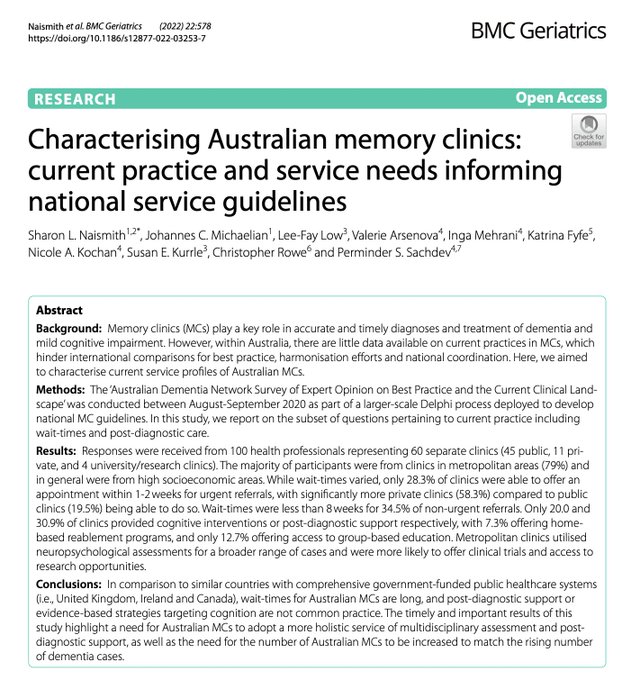 Memory clinics (MCs) play a key role in accurate and timely diagnoses and treatment of dementia and mild cognitive impairment. However, within Australia, there are little data available on current practices in MCs, which hinder international comparisons for best practice, harmonisation efforts and national coordination.
Memory clinics (MCs) play a key role in accurate and timely diagnoses and treatment of dementia and mild cognitive impairment. However, within Australia, there are little data available on current practices in MCs, which hinder international comparisons for best practice, harmonisation efforts and national coordination.
The ‘Australian Dementia Network Survey of Expert Opinion on Best Practice and the Current Clinical Landscape’ was conducted between August-September 2020 as part of a larger-scale Delphi process deployed to develop the First National Service Guidelines for MC Clinics. A newly published research study by ADNeT researchers, ‘Characterising Australian memory clinics: current practice and service needs informing national service guidelines’, reports on the subset of questions pertaining to current practice and service profiles of Australian MCs, including wait-times and post-diagnostic care.
ADNeT Memory Clinics Lead Professor Sharon Naismith said the results, “show we need to increase funds and services to improve wait times, cognitive interventions, post-diagnostic support and increased regional and rural support.”
ADNeT Associate Investigator Professor Lee-Fay Low said, “The ADNeT memory clinic survey showed that wait times for public Australian memory clinics are long in comparison to the UK, Ireland and Canada and even longer in regional areas. Post-diagnostic support or evidence-based strategies targeting cognition are not common practice. We need more memory clinics, particularly servicing regional areas, and funding and service models may better integrate memory clinic teams and primary care.”
Read the full research study here
A national survey on current cognitive intervention practice, training and service needs in memory clinic settings
 The Australian Dementia Network together with the University of Sydney are inviting clinicians, older adult memory clinic patients and neuropsychology students to complete a survey regarding their experiences, interest and preferences in the delivery of cognitive interventions in a memory clinic setting. This information will inform the structure and design of a future training support package for clinicians to facilitate more routine delivery of cognitive interventions for older adults in the memory clinic setting.
The Australian Dementia Network together with the University of Sydney are inviting clinicians, older adult memory clinic patients and neuropsychology students to complete a survey regarding their experiences, interest and preferences in the delivery of cognitive interventions in a memory clinic setting. This information will inform the structure and design of a future training support package for clinicians to facilitate more routine delivery of cognitive interventions for older adults in the memory clinic setting.
You are eligible to participate in this project if you are…
- A health professional (e.g., neuropsychologist, occupational therapist, clinical psychologist etc.) who works clinically with older adult patients (over the age of 50 years) and has experience or is interested in delivering cognitive intervention. Clinicians may also elect to receive information about the future training package, when available.
OR
- An older adult (above the age of 50) who has attended a memory clinic service.
OR
- A neuropsychology student enrolled in a postgraduate training program in Clinical Neuropsychology at an Australian University.
Your responses and opinions will be used to inform our understanding about current cognitive intervention practice, as well as the training and service needs and preferences of clinicians and patients in the memory clinic setting. All responses will be confidential, and no identifiable data will be published.
Survey participation is voluntary and your decision to take part or not will not impact your relationship with the memory clinic, the University of Sydney, or the Australian Dementia Network. More detailed information can be found in the ‘Participant Information Sheet’ at the beginning of the survey.
If you are interested in participating in the survey, click on the survey link here.
Please feel free to forward this email invitation to your networks, as we are keen to obtain as much participation in this process as possible.
For further questions and information please contact the study coordinator, Alessandra Lee alessandra.lee@sydney.edu.au or the Chief Investigator, Professor Sharon Naismith sharon.naismith@sydney.edu.au.
Participants needed for new cognition study
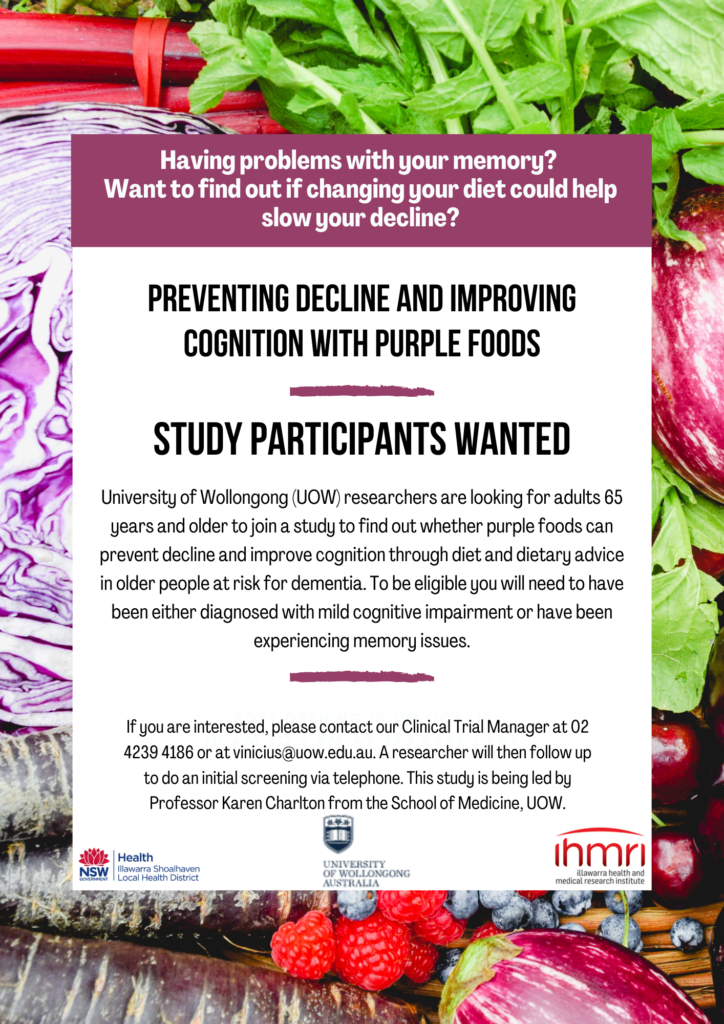
The University of Wollongong researchers are looking for adults for a study on preventing decline and improving cognition with purple foods. Anthocyanins are found in fruits and vegetables, giving them a deep red, blue or purple colour. Eating anthocyanins has been associated with improvement in memory, cardiovascular health, blood pressure and reduced oxidative stress. Researchers want to help test whether compounds found in purple fruits and vegetables can help with brain function.
There will be three different groups allocations in this clinical trial, lasting six months.
Group 1 will receive intensive dietary counselling & resources to help them eat a ‘purple diet. This diet will includes foods that are rich in anthocyanins and you will be supported with recipes and tips to ensure that changing your diet will be convenient, tasty and affordable. A financial compensation of $100.00 will be provided for this group.
Group 2 will receive a freeze-dried anthocyanin supplement derived from blackcurrants.
Group 3 will receive a placebo product (control group).
To be eligible you will need to be 65 years and older and have been diagnosed with mild cognitive impairment or experiencing memory issues. Contact 02 4239 4186 or vinicius.rosario@gmail.com for more detailed information and support to consent participation in the study.
Events
 CogSleep Symposium 2022
CogSleep Symposium 2022
The CogSleep fourth annual symposium will be held in-person across two days on Thursday 1st and Friday 2nd September 2022. This event will be held in Sydney and includes networking opportunities, CogSleep Academy catch-ups and an exciting program featuring national and international researchers.
You can also hear about the range of incredible work being conducted across the CogSleep network from researchers at all career stages. There are also two workshops running preceding the symposium:
Workshop One- Assessing and Treating Sleep Problems in Older Adults (More information here)
Workshop Two- Insomnia Toolkit for GPs (More information here)
The event will be offered as a hybrid event, so that those who are unable to attend in-person may join virtually.
Register your attendance: https://cogsleep.sydney.edu.au/symposium-2022/
Please contact cogsleep.cre@sydney.edu.au if you have any questions.
Updates
 GRANTS FOR EARLY-MID CAREER RESEARCHERS
GRANTS FOR EARLY-MID CAREER RESEARCHERS
Are you an early to mid-career (EMCR) dementia researcher looking for grant opportunities, but not sure where to start? The ADNeT EMCR Accelerator group has put together a list of both dementia-specific and general EMCR grant opportunities. The list will be updated regularly with dates and status of application rounds.
If you know of any other relevant grant opportunities, please do not hesitate to contact either Ayeisha Milligan Armstrong (ayeisha.milligan@postgrad.curtin.edu.au) or Dr Julien Bensalem (julien.bensalem@sahmri.com).
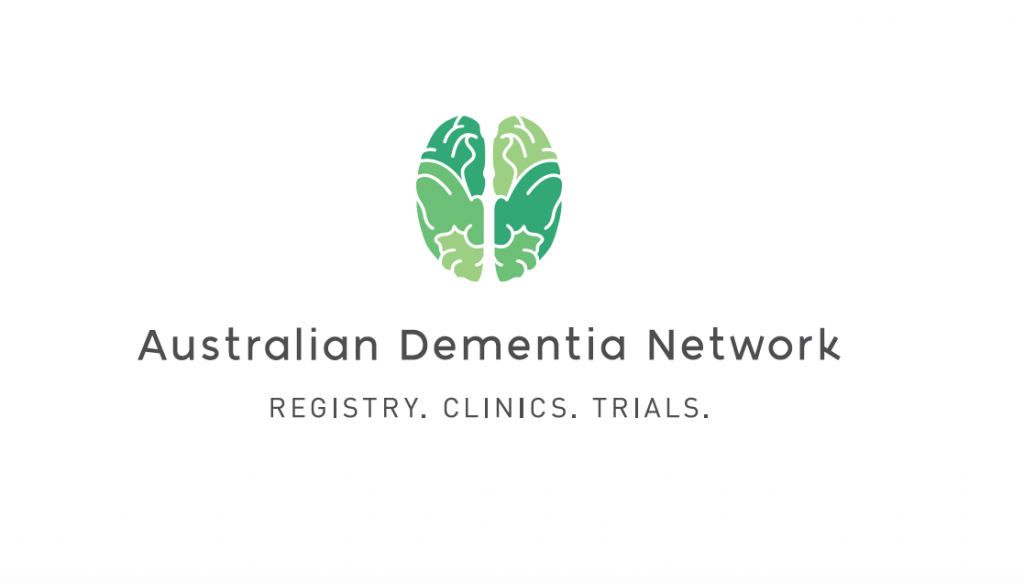
ADNeT WEBSITE UPDATE
Please note our ADNeT website has been moved onto a new server. If you have any difficulties accessing any part of the ADNeT website, please takes steps to clear your cache and browsing history to rectify the issue. If you require assistance please contact adnet-info@unimelb.edu.au
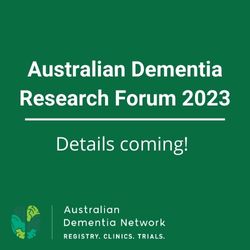 Australian Dementia Research Forum 2023
Australian Dementia Research Forum 2023
ADNeT is already planning for the next Annual Australian Dementia Research Forum 2023. Stay tuned for next month’s newsletter for further details and exciting announcements.
Upcoming webinars

Enabling Conversation and Connection: Can a speech pathologist help?
Join the Young Onset Dementia-Special Interest Group (YOD-SIG) for a webinar presentation from experienced speech pathologists, where we explore the importance of talking about communication in young onset dementia and showcasing a range of evidence-based strategies and therapy options that can help enable conversation and connection.
The presentation will be of interest to people living with young onset dementia and their care partners, as well as health professionals and dementia researchers.
We hope this sparks a conversation regarding the role of allied health in dementia care and the need to improve access to proactive services that prioritise quality of life and social participation.
When: Fri., 16 September 2022
12:00 pm – 1:00 pm AEST (ONLINE)
Find out more and register here
Catch-Up Viewing
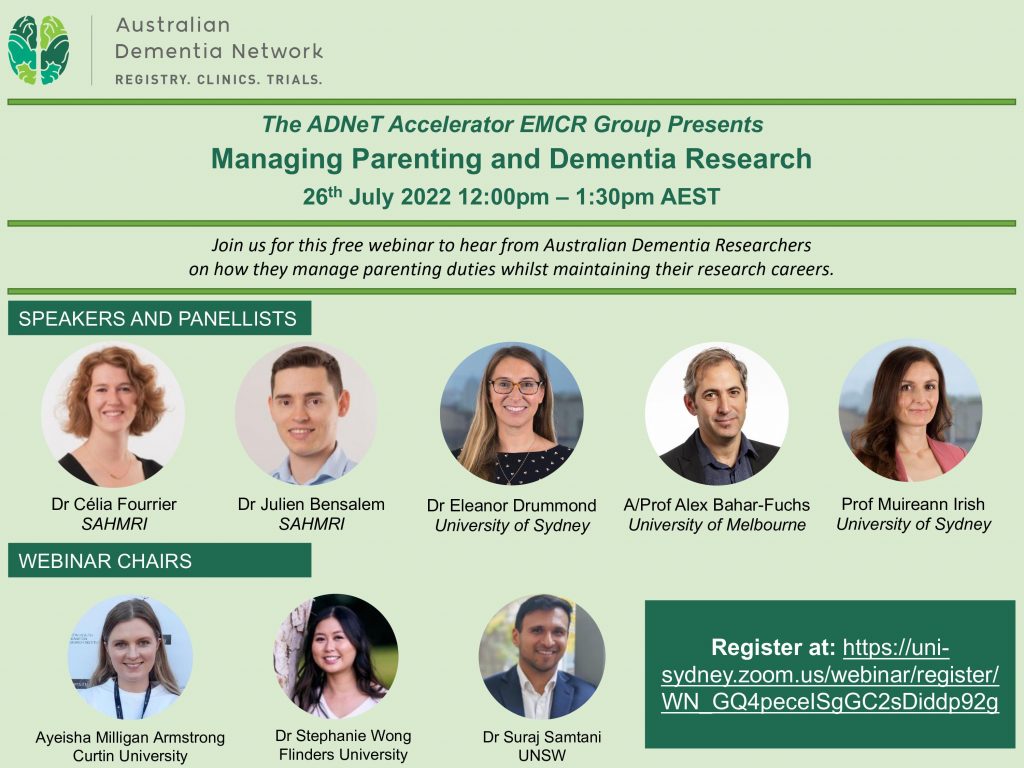
Managing Parenting and Dementia Research
Watch the latest webinar from our Early-Mid Career Researcher Accelerator Group: Managing Parenting and Dementia Research.
Our speakers share & discuss how to manage parenting duties while maintaining research careers.
